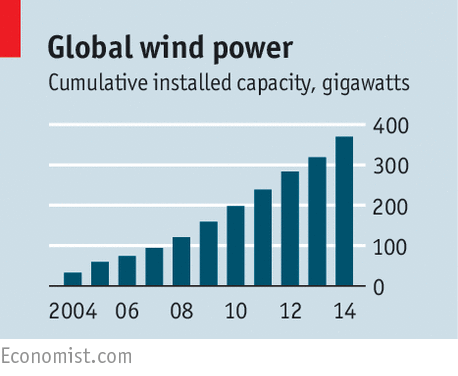[font face=Serif][font size=5]Puffs of hope[/font]
[font size=4]Wind and solar energy are increasingly competitive. But a lot has to change before they can make a real impact[/font]
Aug 1st 2015 | From the print edition
[font size=3]ON THE afternoon of July 25th renewable generators fulfilled about 78% of Germany’s domestic demand. Such a remarkable figure, combined with news of booming wind industries in America (see
article) and China (
article), might lead you to think that the renewables revolution is more or less victorious, with the world moving forward into the broad, sunlit—and windy—uplands of copious clean energy. Alas, this is not the case.
In some places wind turbines and solar cells are now a cheaper way of generating electricity than fossil fuels are. And in a lot of others subsidies and regulatory requirements encourage their use regardless. But despite this progress, bought at great expense, renewables other than hydropower still provide less than 3% of the world’s energy. The impressive growth of wind power lags behind the rate that the International Energy Agency (IEA), a Paris-based intergovernmental think-tank, suggests is necessary for the world to have a good chance of limiting global warming to less than 2°C. That two-degree scenario requires the world to generate 11 times more wind power by 2050, and 36 times more solar power. And it requires a big helping of new nuclear power, too. If, like German Greens and many others, you would rather do without that helping hand, the requirement for further renewables becomes yet more far-fetched.

The most equitable and straightforward way to move towards more low-carbon energy would be a global system of steadily escalating carbon taxes. In the absence of such an enlightened policy, though, there are other ways to encourage the spread of renewables.
Removing subsidies around the world on fossil fuels is one of them. Another is increasing public investment in low-carbon energy research. Research into renewable energy, storage systems and energy transmission accounts for only about 1% of government R&D spending in rich countries. This has meant that the renewables boom of the past decade, especially in the case of wind, has been mostly a come-as-you-are affair: big subsidies for the deployment of today’s technology but very little spent on tomorrow’s.
...[/font][/font]
